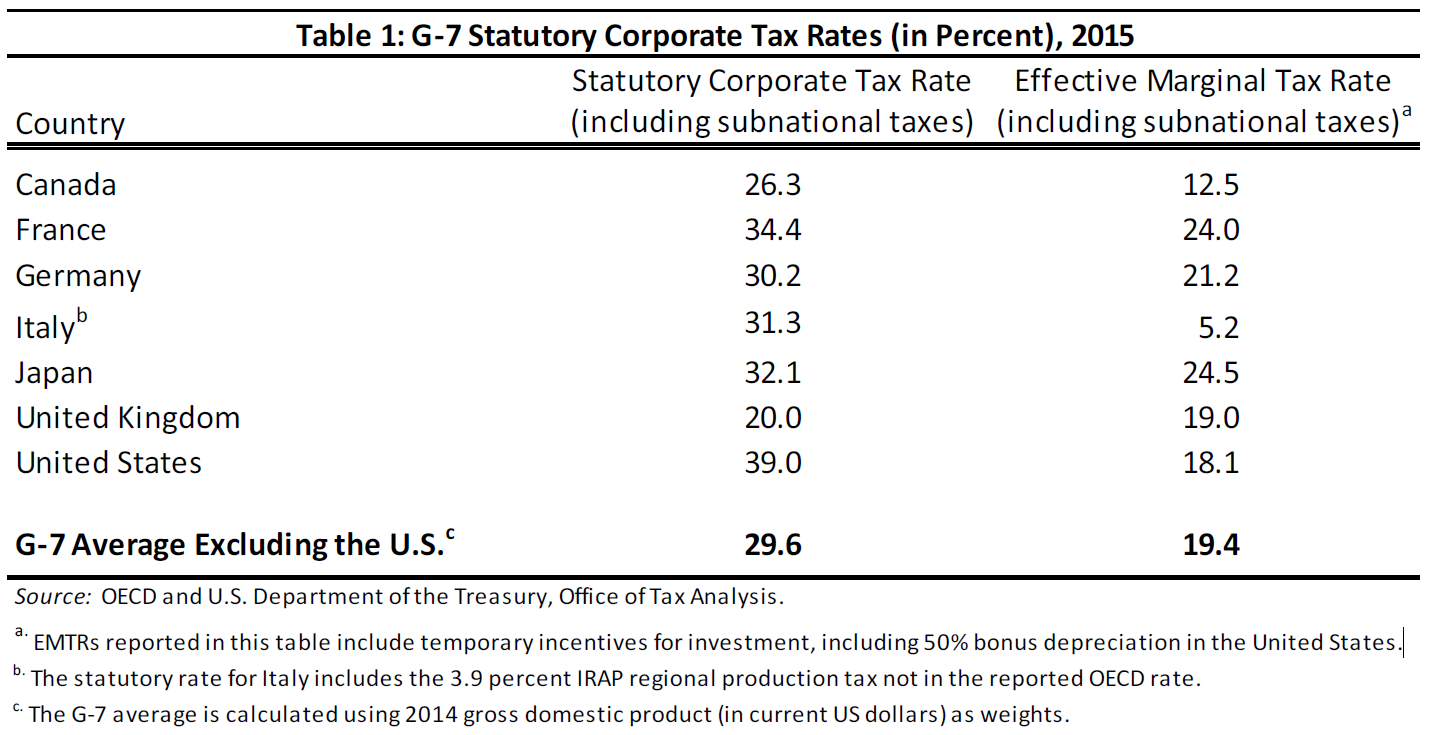Much Ado About Nothing?
Understanding the Yield Spread
April 4, 2016Is Tax Avoidance Economically Efficient?
April 6, 2016What was Shakespeare writing about back in 1598? Perhaps the hot debate over US corporate ‘tax inversions?’
Probably not.
Regardless, is this topic really worth all the hand-wringing? Or is the issue of a critical nature? Let’s take a look.
First, what is a ‘tax inversion’ and why do we care? It’s really pretty simple: Like a human, a corporation is supposed to pay annual corporate income taxes to the country where it ‘lives.’ Just like you and me.
And like you and me, it can change where it lives. For example, last year Allergan agreed to be ‘acquired’ by Pfizer for $160 billion – and ‘move’ to Ireland. A country where the annual corporate tax rate is 12.5%. The US annual corporate tax rate, as you can see from the chart below, is 39%.
How important is this? Well, here’s a snippet from recent Allergan press release on Q4 earnings in 2015:
“DUBLIN, Feb. 22, 2016 /PRNewswire/ — Allergan plc (NYSE: AGN) reported exceptional performance with net revenue from continuing operations increasing 74 percent to $4.2 billion for the quarter ended December 31, 2015….”
On that income, they generated EBIT of $1.9 billion. For simple math, let’s multiply this by 4 (4 quarters) and we get an annual net income of $7.6 billion. Taxes on $7.6 billion – at 12.5% – are $950 million. At the US 39% tax rate: $2,964 million – or about $2 billion more. Hmmm….this definitely is NOT nothing. For both Allergan and the US. Combine this with Pfizer’s net income and this is a really BIG issue!
A few days ago, the White House and the US Treasury released a joint report entitled, “THE PRESIDENT’S FRAMEWORK FOR BUSINESS TAX REFORM:
AN UPDATE”. A scintillating 31-page read, this report attempts to lay out the governments case for preventing tax inversions. From the report: “Particularly notable is the recent wave of corporate inversions, transactions in which a U.S. corporation shifts its legal residence abroad to be deemed a foreign company for U.S. tax purposes, even as it frequently keeps management and business operations here. The Congressional Research Service identified 23 inversions since 2012….”
How much is this costing the US Treasury each year – in ‘lost’ tax revenue? From the report, “Academic research suggests that the cost of profit shifting has increased substantially in recent years and may now cost the United States more than $100 billion per year in foregone tax revenue.”
Corporations, on the other hand, say the solution is simple: Fix the tax code. Make the US more competitive – from a tax perspective. Here’s a chart from report:
By the way, ignore the ‘Effective Marginal Tax Rate’ column. I believe it misrepresents the issue…which, in itself, is a bit disappointing. How? Read the footnote: You’ll see the words “temporary” and “bonus“, both of which last typically one year.
At 39%, the US cannot complete. Even with temporary gimmicks. Reform is needed.
The government report does agree that the tax system is dysfunctional:
“While inversions are a particularly prominent symptom of a broken tax system, and one that should be addressed immediately even absent broader business tax reform, the issues run much deeper. In the face of these challenges, inaction is not an option. The combination of the relatively high U.S. corporate rate and our complicated system for taxing multinational businesses has encouraged and facilitated the erosion of the tax base. It also has made America a less attractive place to start and grow an international business, and complicated and distorted business decisions.”
The challenge, of course, is how can this problem be rectified during an election year? Probably an impossible task.
Here’s an interesting question for you: How many pages is the federal tax code today? Check this out:
In 2013, the number was 73,954, according to Wolters Kluwer, CCH, which has analyzed the federal tax code since 1913. 187 times longer than it was a century ago. Staggering.
Yep, I think we have a problem here. This is a mess.
- Terry Liebman






0 Comments
Another good one. So what is the fix?
Sent from my iPad
Thanks Craig. Well, I guess we could trim the number of tax code pages to … say … only 73,000? LOL. Just kidding.
Ironically, with all that complexity, US total tax revenues as a percentage of GDP have been relatively constant. For example, in 1974 when we had 19,500 pages, total tax revenue collected, as a percent of GDP, was 17%. In 1984 with 26,300, the Treasury collected 16.49%. In 2004, with over 60,000 pages of code, 15.31%. Lately, in the past 5 years, the number has hovered between 14.5 and 18%. Here’s the source of this data:
https://research.stlouisfed.org/fred2/series/FYFRGDA188S
So, the solution? Simple. Shred the code. The whole thing. Rethink the issue and design a new system where total annual revenue collected by the US Treasury equals a fixed percentage of the GDP. Say 19%. This is a simplistic statement for a very complex issue…but it can be done. GDP doesn’t always equal ‘income’ so this would have to be thought out.
A flat tax? Perhaps. Maybe a series of ‘flat levels’ to ensure PIT tax isn’t too regressive?
And then there are the unintended consequences of such an action. CPAs and tax attorneys will have a lot of time on their hands. What do we do with them? 🙂
Thoughts…worth considering.
Your take?
– Terry
I used to have a tax inversion. I had my doctor remove it. I’m better now.
Was it painful?
Even enlightened progressive/ more socialist countries like Canada and England get it, tax business unfairly and they will leave. People vote with their wallets, when people learn companies need profits to employ people then they will stop electing tax and spend politicians. Tax the rich and big corporations never works, it hurts the poor, no jobs.
Thanks John.
[…] ← Much Ado About Nothing? […]